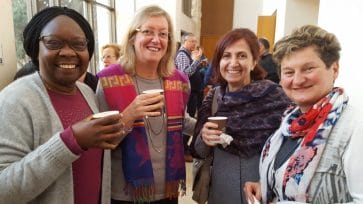
Feb 15, 2019 | Non categorizzato
The Focolare’s General Council, on retreat in the Holy Land, has just finished three days’ work on the communion of goods, the new generations and the 2020 General Assembly. 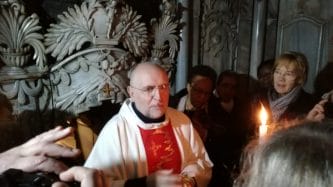 “Jesus, who was buried here and rose from the dead, wants to live in our midst so that we can bring his presence throughout the world.” Those are the words of Jesús Morán, Co-President of the Focolare Movement, after celebrating Mass for the General Council in the Church of the Holy Sepulchre. Everyone rose at dawn to be able to enter that extraordinary place – one that seems deeply connected with their week-long retreat in the Holy Land. Standing before the tomb left empty by the Risen Jesus, they too posed questions about the future, just as the disciples must have done. Where is the Risen Lord leading the Focolare Movement today? Where should the Movement focus its strength, energy and resources?
“Jesus, who was buried here and rose from the dead, wants to live in our midst so that we can bring his presence throughout the world.” Those are the words of Jesús Morán, Co-President of the Focolare Movement, after celebrating Mass for the General Council in the Church of the Holy Sepulchre. Everyone rose at dawn to be able to enter that extraordinary place – one that seems deeply connected with their week-long retreat in the Holy Land. Standing before the tomb left empty by the Risen Jesus, they too posed questions about the future, just as the disciples must have done. Where is the Risen Lord leading the Focolare Movement today? Where should the Movement focus its strength, energy and resources?  These questions permeated discussions on the three key subjects addressed in Jerusalem. Concerning the “communion of goods, economy and work”, the General Council noted that in all the various parts of the Movement there is a great desire to go back to the radical life of the early days and live the communion of goods with new consistency and commitment. Ways in which this could be enabled concretely were discussed. Consideration of the new generations of the Focolare Movement, the second main subject, was enriched by evaluating the Genfest held last year in Manila and the recent World Youth Day in Panama. Those two events highlighted the great potential of young people and teenagers. This is also seen in their work for the “Pathways for a United World” project and their commitment to “Zero Hunger” by 2030. Thought was given on how to give continuity to individual initiatives.
These questions permeated discussions on the three key subjects addressed in Jerusalem. Concerning the “communion of goods, economy and work”, the General Council noted that in all the various parts of the Movement there is a great desire to go back to the radical life of the early days and live the communion of goods with new consistency and commitment. Ways in which this could be enabled concretely were discussed. Consideration of the new generations of the Focolare Movement, the second main subject, was enriched by evaluating the Genfest held last year in Manila and the recent World Youth Day in Panama. Those two events highlighted the great potential of young people and teenagers. This is also seen in their work for the “Pathways for a United World” project and their commitment to “Zero Hunger” by 2030. Thought was given on how to give continuity to individual initiatives.  The third subject was preparations for the upcoming General Assembly in 2020. The General Council studied ways in which the Assembly can reflect the various vocations within the Movement and their geographical and cultural diversity. They also discussed how to reconcile the need for continuity and the need for innovation that characterise the Movement at present. A commission will shortly be formed to organise the Assembly and their work will be based on these two areas. While the retreat may seem to be made up of questions without answers, that was not the case. While it was agreed not to draw up a statement or guidelines, what came to light is the journey being travelled now, the fruit of the Movement’s life throughout the world. Posing questions about the journey; being challenged by the issues of the day and seeking answers; drawing on the past to look to the future: all this can yield unexpected effects. All this can enable us to meet the Risen Lord on unexpected roads, just as happened to the two disciples who, leaving the empty tomb behind them, set off towards Emmaus.
The third subject was preparations for the upcoming General Assembly in 2020. The General Council studied ways in which the Assembly can reflect the various vocations within the Movement and their geographical and cultural diversity. They also discussed how to reconcile the need for continuity and the need for innovation that characterise the Movement at present. A commission will shortly be formed to organise the Assembly and their work will be based on these two areas. While the retreat may seem to be made up of questions without answers, that was not the case. While it was agreed not to draw up a statement or guidelines, what came to light is the journey being travelled now, the fruit of the Movement’s life throughout the world. Posing questions about the journey; being challenged by the issues of the day and seeking answers; drawing on the past to look to the future: all this can yield unexpected effects. All this can enable us to meet the Risen Lord on unexpected roads, just as happened to the two disciples who, leaving the empty tomb behind them, set off towards Emmaus.
Joachim Schwind
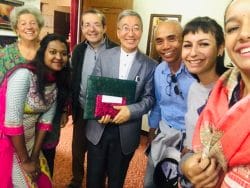
Jan 31, 2019 | Non categorizzato
The desire to share the discovery that has given meaning and joy to their lives – this is what drives someone to set out to give life to a temporary focolare. This way others too can experience the most beautiful of adventures – living for universal fraternity. 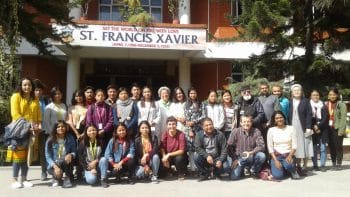 They are young people, adults and families, who set off in small groups to visit distant countries where communities and villages await them. For a while they travel along the same road together, experiencing mutual acceptance and an exchange between the different cultures. They give of themselves to the others and they “make themselves one” with the others – in their joys and in their sorrows. They are certain that it is through loving our neighbours that each one of us finds our own full realisation. They believe that fraternity is possible between people of different faiths and beliefs and that the Golden Rule – “Do to others what you would have done to you” – exists for everyone to make it their own. These small groups are the so-called “temporary focolares”, a travelling version of the traditional focolares. They function as central points of the Movement in various territories. They are like beating hearts sharing the life within them. In recent years there have been dozens of them, all following in the wake of the “pioneers” of the Focolare Movement who, ever since the 1950s, were sent out by Chiara Lubich like modern apostles to bring the charism of unity to different continents.
They are young people, adults and families, who set off in small groups to visit distant countries where communities and villages await them. For a while they travel along the same road together, experiencing mutual acceptance and an exchange between the different cultures. They give of themselves to the others and they “make themselves one” with the others – in their joys and in their sorrows. They are certain that it is through loving our neighbours that each one of us finds our own full realisation. They believe that fraternity is possible between people of different faiths and beliefs and that the Golden Rule – “Do to others what you would have done to you” – exists for everyone to make it their own. These small groups are the so-called “temporary focolares”, a travelling version of the traditional focolares. They function as central points of the Movement in various territories. They are like beating hearts sharing the life within them. In recent years there have been dozens of them, all following in the wake of the “pioneers” of the Focolare Movement who, ever since the 1950s, were sent out by Chiara Lubich like modern apostles to bring the charism of unity to different continents.  Nepal is a meeting point between the Mongolian populations of Asia and the Caucasian populations of the Indian plains. There is a profound sense of spirituality there with Buddhism practised side by side with Christianity and Hinduism. In 2018, from October 20 to November 7, a group of focolarini made their way to Nepal, travelling from the capital Kathmandu to Dharan, in the south, and then further north to Pokhara. Their goal was to build relationships. Coming from India, Italy and Great Britain, the members of the focolare group immediately immersed themselves in the Nepalese culture. On their arrival the Dashain Hindu festival was in progress. It’s the largest Hindu festival and it involves the whole country. The group participated in the Tika ritual, and received the traditional blessing. In Daharan, the group was welcomed in parishes where they spoke of the history of the Focolare Movement and of its commitment to universal fraternity. They were met with great enthusiasm from the people and the priests. In the capital, the group was joined by two Nepalese young people who had participated in the 2018 Genfest in Manila. They shared their experience with the students of a school run by Jesuit fathers. In Pokhara they met with some Hindu families. Although they were poor and had very little to live on, harmony and dignity filled their homes. After the focolarini spoke about the ideal of unity, they were invited to have lunch together while listening to traditional music.
Nepal is a meeting point between the Mongolian populations of Asia and the Caucasian populations of the Indian plains. There is a profound sense of spirituality there with Buddhism practised side by side with Christianity and Hinduism. In 2018, from October 20 to November 7, a group of focolarini made their way to Nepal, travelling from the capital Kathmandu to Dharan, in the south, and then further north to Pokhara. Their goal was to build relationships. Coming from India, Italy and Great Britain, the members of the focolare group immediately immersed themselves in the Nepalese culture. On their arrival the Dashain Hindu festival was in progress. It’s the largest Hindu festival and it involves the whole country. The group participated in the Tika ritual, and received the traditional blessing. In Daharan, the group was welcomed in parishes where they spoke of the history of the Focolare Movement and of its commitment to universal fraternity. They were met with great enthusiasm from the people and the priests. In the capital, the group was joined by two Nepalese young people who had participated in the 2018 Genfest in Manila. They shared their experience with the students of a school run by Jesuit fathers. In Pokhara they met with some Hindu families. Although they were poor and had very little to live on, harmony and dignity filled their homes. After the focolarini spoke about the ideal of unity, they were invited to have lunch together while listening to traditional music.  The group then visited Bishop Paul Simick, the Apostolic Vicar of Nepal, who said he was happy about their presence in the country and invited them to meet the priests. This journey to Nepal was a journey of mutual enrichment, where the ideal of unity met the local cultures. A Buddhist saying describes it effectively: Those who have “high” thoughts are not happy to remain in the same place. Instead, like the swans, they leave their own home and fly towards a higher home.
The group then visited Bishop Paul Simick, the Apostolic Vicar of Nepal, who said he was happy about their presence in the country and invited them to meet the priests. This journey to Nepal was a journey of mutual enrichment, where the ideal of unity met the local cultures. A Buddhist saying describes it effectively: Those who have “high” thoughts are not happy to remain in the same place. Instead, like the swans, they leave their own home and fly towards a higher home.
Claudia Di Lorenzi
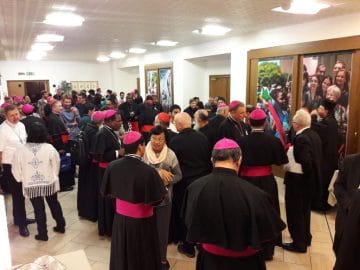
Oct 17, 2018 | Non categorizzato
Conversations in different languages could be heard amid the tastefully and simply set tables. For three evenings, the young people of the Focolare acted as hosts in a hall, close to where the works of the Synod will carry on up to 28 October. After a warm welcome, the three dinners revealed to be the right occasions for the exchange of ideas, informal sharing and mutual interaction. During dessert, there was a presentation of the recent international Genfest held in Manila and some experiences, and stories of commitment and coherence to boost closer contact with the synodal Fathers, in line with a meeting held a day earlier, where they express queries, uncertainties, choices, in the hope that the Synod would propose some answers. In the second soiree, František from Czechia took the floor. His words highlighted a genuine passion for politics and concrete commitment in view of the next European Parliament elections emerged with the request, “Please support me with your prayers, so that I may always be faithful to the choice of serving my people, without any personal interest.” A similar story came from Nicola. She is 33 and a pediatric therapist in a university hospital. “I engage in rare pathologies and pediatric insurgence, and therefore I am always in contact with situations often at the brink of death. The difficulty at times lies in communicating to the relatives, the prognosis and life expectancies of the child. In these moments, I entrust myself to God, so that he may help me find the right words and attitude. Cynical detachment is a due form of survival, but we mustn’t lose the human dimension. Every day for me is like a gym in which to love and serve God.” Then it was Nicola’s turn. “Practicing this profession – he explained – means living at the limit between faith and reason; in these years I have learned what suffering is, and what it means to live immobile on a bed, attached to the mechanical lung for breathing. At times my faith is harshly put to the test, but then I have no time to reflect, being ’forced’ to see to the people I have before me, and loving them. This is really a countenance of Jesus Forsaken. If I manage to welcome him poor and miserable as he is, this fills up the void. I have to face many situations.  The families of the eastern countries are at times the most desperate since they do not have adequate healthcare systems, both from the economic and clinical standpoints that can help them. This is why they undertake hope journeys to our hospitals in search of treatments, which in some cases imply great expenses, given that these are issued only to Italian citizens. These situations lead us to reflect that at times, being born in one part of the world is just a matter of luck. It is in these cases that God reveals his grandeur and asks you to do the impossible. We certainly must not break the laws but we can try to help in other ways, for example, proposing strategies to limit at best the deformity of the joints, or trying to stand by and be of help.” Time had flown. It seemed like the guests did not wish to leave. The challenge of a deep and reciprocal listening between generations, the reason for the Synod itself, had also taken the form and consistency even in a dinner. And the dinner ended with the words of the song dedicated to Mary, the silent response of utmost love. By Chiara Favotti and Gustavo Clariá
The families of the eastern countries are at times the most desperate since they do not have adequate healthcare systems, both from the economic and clinical standpoints that can help them. This is why they undertake hope journeys to our hospitals in search of treatments, which in some cases imply great expenses, given that these are issued only to Italian citizens. These situations lead us to reflect that at times, being born in one part of the world is just a matter of luck. It is in these cases that God reveals his grandeur and asks you to do the impossible. We certainly must not break the laws but we can try to help in other ways, for example, proposing strategies to limit at best the deformity of the joints, or trying to stand by and be of help.” Time had flown. It seemed like the guests did not wish to leave. The challenge of a deep and reciprocal listening between generations, the reason for the Synod itself, had also taken the form and consistency even in a dinner. And the dinner ended with the words of the song dedicated to Mary, the silent response of utmost love. By Chiara Favotti and Gustavo Clariá
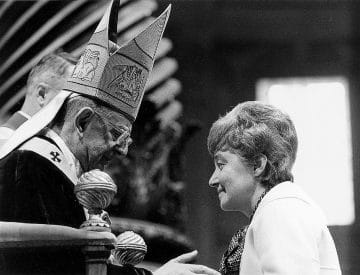
Oct 14, 2018 | Focolare Worldwide
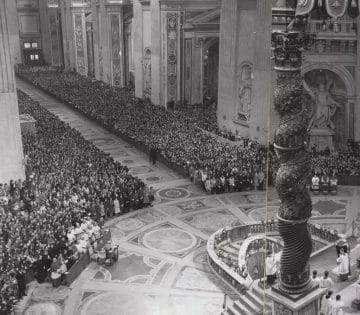 “YOUNG GEN! We welcome you with great joy as sons and daughters, brothers and sisters, friends! […] To search is really part of being a young person. Once the eyes of consciousness have opened on the world around us, curiosity is aroused in the souls of young people: they want to know, they want to try above anything else, and they want to attempt. Search, but for what? […] You, the young people of our times, you already have a negative answer, an almost rebellious answer in your hearts: we don’t want, you say, a world that presents itself to use like this! It’s a strange phenomenon: a world that offers you the most beautiful, the most perfect, the most enjoyable fruits of contemporary civilisation, doesn’t satisfy you, doesn’t please you. You benefit from the achievements, the comforts, the wonders placed at your disposal by modern progress. Yet a sense of criticism, protest and even nausea stops your search in this direction. This is a direction that takes you out of yourselves, an alienation because at the basis, it is a materialistic, hedonistic and selfish direction. It does not fully satisfy the soul. It does not completely resolve the important and personal problems of life. […] You have made a different choice. This is why you are called Gen, new generation. It is before all else a liberating choice, liberating from the passive conformism that affects so many young people of our times… At the basis of your psychology is a personal and sovereign act of free determination. The choice of Christ. […] Jesus Christ has crossed your path; and this is why you are here. Yes, the meeting with Him, Jesus Christ. But who is Jesus Christ? What an infinite question! […] Well: first, in Himself, Christ is the word of God made man; Christ is for us the Saviour of humanity. Two oceans: the Jesus Christ’s divinity, and Jesus Christ’s mission in the world. […] It seems to us that you, Focolarini, have faced this dual problem: Who is He, Christ? And Who is He, Christ, for us? And now the fire of light, enthusiasm, action, the gift of self and joy has been lit within you, and with a newfound inner fullness you have understood everything, God, yourselves, your life, people, our times, the central direction to take for the whole of your existence. Yes, this is the solution, this is the key, this is the formula, ancient and eternal, and when it is discovered, new. You have intuited it, and you have, rightfully, given your movement the definition of ‘New Generation’, Gen!
“YOUNG GEN! We welcome you with great joy as sons and daughters, brothers and sisters, friends! […] To search is really part of being a young person. Once the eyes of consciousness have opened on the world around us, curiosity is aroused in the souls of young people: they want to know, they want to try above anything else, and they want to attempt. Search, but for what? […] You, the young people of our times, you already have a negative answer, an almost rebellious answer in your hearts: we don’t want, you say, a world that presents itself to use like this! It’s a strange phenomenon: a world that offers you the most beautiful, the most perfect, the most enjoyable fruits of contemporary civilisation, doesn’t satisfy you, doesn’t please you. You benefit from the achievements, the comforts, the wonders placed at your disposal by modern progress. Yet a sense of criticism, protest and even nausea stops your search in this direction. This is a direction that takes you out of yourselves, an alienation because at the basis, it is a materialistic, hedonistic and selfish direction. It does not fully satisfy the soul. It does not completely resolve the important and personal problems of life. […] You have made a different choice. This is why you are called Gen, new generation. It is before all else a liberating choice, liberating from the passive conformism that affects so many young people of our times… At the basis of your psychology is a personal and sovereign act of free determination. The choice of Christ. […] Jesus Christ has crossed your path; and this is why you are here. Yes, the meeting with Him, Jesus Christ. But who is Jesus Christ? What an infinite question! […] Well: first, in Himself, Christ is the word of God made man; Christ is for us the Saviour of humanity. Two oceans: the Jesus Christ’s divinity, and Jesus Christ’s mission in the world. […] It seems to us that you, Focolarini, have faced this dual problem: Who is He, Christ? And Who is He, Christ, for us? And now the fire of light, enthusiasm, action, the gift of self and joy has been lit within you, and with a newfound inner fullness you have understood everything, God, yourselves, your life, people, our times, the central direction to take for the whole of your existence. Yes, this is the solution, this is the key, this is the formula, ancient and eternal, and when it is discovered, new. You have intuited it, and you have, rightfully, given your movement the definition of ‘New Generation’, Gen!  So, dear Young Gen! Encounter, know, love, follow Jesus Christ! This is your program. This is the synthesis of your spirituality which you, by celebrating the Jubilee of the Holy Year, wish to reaffirm in your consciences and translate into life. With two conclusions. The first, in order to condense the secret of your Movement in a central and mature thought try always to have Jesus as Teacher. And then the second conclusion, that we likewise listen to the words spoken by Jesus the Teacher: ‘You are all brothers and sisters’. Have the wisdom and courage to reach this conclusion which is the root of Christian social teaching. It is often disconcerting to observe how many claiming to be those who follow the Gospel are incapable of deducing from the Gospel itself a social teaching based on love. […] You, the new Generation, are faithful and coherent. If you have chosen Christ as your Master, have faith in Him and in the Church which leads and presents Him to you. Demonstrate with actions the realizing force of charity and social love, established by the Master. It will be an experience, yes, a new one, one which generates a better and more just world. It will be a strong experience; demanding resistance, sacrifice, maybe even heroism; it will demand that you too are the robust and willing Cyrenians who offer their own backs to support the Cross of Jesus. Yes, you should also suffer with Him, as Him, for Him! But do not be afraid, Gen! Be sure! You will have operated your salvation and that of our modern world. And just as you are today, you will always be good and happy!”
So, dear Young Gen! Encounter, know, love, follow Jesus Christ! This is your program. This is the synthesis of your spirituality which you, by celebrating the Jubilee of the Holy Year, wish to reaffirm in your consciences and translate into life. With two conclusions. The first, in order to condense the secret of your Movement in a central and mature thought try always to have Jesus as Teacher. And then the second conclusion, that we likewise listen to the words spoken by Jesus the Teacher: ‘You are all brothers and sisters’. Have the wisdom and courage to reach this conclusion which is the root of Christian social teaching. It is often disconcerting to observe how many claiming to be those who follow the Gospel are incapable of deducing from the Gospel itself a social teaching based on love. […] You, the new Generation, are faithful and coherent. If you have chosen Christ as your Master, have faith in Him and in the Church which leads and presents Him to you. Demonstrate with actions the realizing force of charity and social love, established by the Master. It will be an experience, yes, a new one, one which generates a better and more just world. It will be a strong experience; demanding resistance, sacrifice, maybe even heroism; it will demand that you too are the robust and willing Cyrenians who offer their own backs to support the Cross of Jesus. Yes, you should also suffer with Him, as Him, for Him! But do not be afraid, Gen! Be sure! You will have operated your salvation and that of our modern world. And just as you are today, you will always be good and happy!”
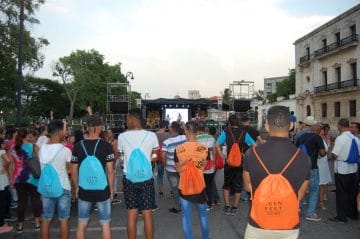
Sep 2, 2018 | Focolare Worldwide
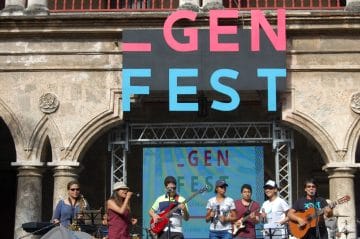 “The first Genfest ever in Cuba ended on Sunday, August 12. It was dream that we had kept in our hearts, entrusted to God, and he made it happen!” So write the Youth for a United World in Cuba. A wave of young people from all over the island came to Havana for the Genfest, an event that had “many firsts.” In fact, they write, up until now “we had never been able to put together an event of this size, obtaining the necessary permissions from the Party office in charge of relationships with religious organizations, with whom there was an excellent collaboration. It was achieved with the help of artists and professionals who through their passion, dedication and by not holding anything back – despite enormous challenges – were able to give harmony and beauty to the content that the young people asked for, after months of working together.” The opening event took place in the historic centre of the city, where Pope Francis had invited the Cuban youth in September 2015 to foster “social friendships” with and among everyone, “to build the Cuba you dream of.” On Saturday, August 11, participants explored the theme of “Beyond all borders” in nine workshops about social economics, Economy of Communion, ecumenism, relationships, the skills need to build peace, postmodernism, etc.
“The first Genfest ever in Cuba ended on Sunday, August 12. It was dream that we had kept in our hearts, entrusted to God, and he made it happen!” So write the Youth for a United World in Cuba. A wave of young people from all over the island came to Havana for the Genfest, an event that had “many firsts.” In fact, they write, up until now “we had never been able to put together an event of this size, obtaining the necessary permissions from the Party office in charge of relationships with religious organizations, with whom there was an excellent collaboration. It was achieved with the help of artists and professionals who through their passion, dedication and by not holding anything back – despite enormous challenges – were able to give harmony and beauty to the content that the young people asked for, after months of working together.” The opening event took place in the historic centre of the city, where Pope Francis had invited the Cuban youth in September 2015 to foster “social friendships” with and among everyone, “to build the Cuba you dream of.” On Saturday, August 11, participants explored the theme of “Beyond all borders” in nine workshops about social economics, Economy of Communion, ecumenism, relationships, the skills need to build peace, postmodernism, etc.  “In the afternoon, at one of the city’s famous cinemas with close to 600 participants, there were testimonies through art and shared experiences on how it is worth living for a united world. There was a profound moment in particular: an actress portrayed Chiara Lubich and her thoughts on how suffering generates life, which is the secret to going ‘beyond all borders.’” “This was the most beautiful experience of my life,” wrote one young woman, “where unity and love are the essence of a lifestyle that builds a more united world. You were able to awaken my faith and hope.” “For those of us who worked on this for almost a year,” says one of the organizers, “it was a long journey that was not without its challenges, due to conditions in the country. However, there was always the help of divine providence, which would arrive just at the right time to give us courage and resources: from South Korea, Colombia, Bulgaria, Italy, Mexico, Puerto Rico, Canada, the Philippines… “We threw ourselves into doing things we had never done before: singing, dancing, presenting on stage, telling our experiences, overcoming our shyness or being ashamed of anything. We learned to listen to each other more, not impose our opinions, and help ideas emerge together. Practically, we learned to love each other.”
“In the afternoon, at one of the city’s famous cinemas with close to 600 participants, there were testimonies through art and shared experiences on how it is worth living for a united world. There was a profound moment in particular: an actress portrayed Chiara Lubich and her thoughts on how suffering generates life, which is the secret to going ‘beyond all borders.’” “This was the most beautiful experience of my life,” wrote one young woman, “where unity and love are the essence of a lifestyle that builds a more united world. You were able to awaken my faith and hope.” “For those of us who worked on this for almost a year,” says one of the organizers, “it was a long journey that was not without its challenges, due to conditions in the country. However, there was always the help of divine providence, which would arrive just at the right time to give us courage and resources: from South Korea, Colombia, Bulgaria, Italy, Mexico, Puerto Rico, Canada, the Philippines… “We threw ourselves into doing things we had never done before: singing, dancing, presenting on stage, telling our experiences, overcoming our shyness or being ashamed of anything. We learned to listen to each other more, not impose our opinions, and help ideas emerge together. Practically, we learned to love each other.”  They add, “Genfest was an explosion of love and unity that revolutionized our city.” One of the participants said, “We are making history, not the kind that stays in books, but in the souls of all of us who think, work and participate in the Genfest. The memory of Old Havana remains, and today it is reborn thanks to the Youth for a United World.” “Collaborating with the other movements, youth outreach, and the Council of Churches in Cuba was really nice and productive,” they write. “Genfest in Cuba honored its objective ‘to go beyond every border,’ overcoming huge challenges during the preparation and because of how big it became. It demonstrates how for God, nothing is impossible. We are bringing this revolution of love to the whole world, and many people who did not know of our dream have now witnessed it. We thank all those who believed in this crazy adventure and were there with us with their support. What a profound joy it is to know that we are part of such a big family!”
They add, “Genfest was an explosion of love and unity that revolutionized our city.” One of the participants said, “We are making history, not the kind that stays in books, but in the souls of all of us who think, work and participate in the Genfest. The memory of Old Havana remains, and today it is reborn thanks to the Youth for a United World.” “Collaborating with the other movements, youth outreach, and the Council of Churches in Cuba was really nice and productive,” they write. “Genfest in Cuba honored its objective ‘to go beyond every border,’ overcoming huge challenges during the preparation and because of how big it became. It demonstrates how for God, nothing is impossible. We are bringing this revolution of love to the whole world, and many people who did not know of our dream have now witnessed it. We thank all those who believed in this crazy adventure and were there with us with their support. What a profound joy it is to know that we are part of such a big family!”

 “Jesus, who was buried here and rose from the dead, wants to live in our midst so that we can bring his presence throughout the world.” Those are the words of Jesús Morán, Co-President of the Focolare Movement, after celebrating Mass for the General Council in the Church of the Holy Sepulchre. Everyone rose at dawn to be able to enter that extraordinary place – one that seems deeply connected with their week-long retreat in the Holy Land. Standing before the tomb left empty by the Risen Jesus, they too posed questions about the future, just as the disciples must have done. Where is the Risen Lord leading the Focolare Movement today? Where should the Movement focus its strength, energy and resources?
“Jesus, who was buried here and rose from the dead, wants to live in our midst so that we can bring his presence throughout the world.” Those are the words of Jesús Morán, Co-President of the Focolare Movement, after celebrating Mass for the General Council in the Church of the Holy Sepulchre. Everyone rose at dawn to be able to enter that extraordinary place – one that seems deeply connected with their week-long retreat in the Holy Land. Standing before the tomb left empty by the Risen Jesus, they too posed questions about the future, just as the disciples must have done. Where is the Risen Lord leading the Focolare Movement today? Where should the Movement focus its strength, energy and resources?  These questions permeated discussions on the three key subjects addressed in Jerusalem. Concerning the “communion of goods, economy and work”, the General Council noted that in all the various parts of the Movement there is a great desire to go back to the radical life of the early days and live the communion of goods with new consistency and commitment. Ways in which this could be enabled concretely were discussed. Consideration of the new generations of the Focolare Movement, the second main subject, was enriched by evaluating the Genfest held last year in Manila and the recent World Youth Day in Panama. Those two events highlighted the great potential of young people and teenagers. This is also seen in their work for the “Pathways for a United World” project and their commitment to “Zero Hunger” by 2030. Thought was given on how to give continuity to individual initiatives.
These questions permeated discussions on the three key subjects addressed in Jerusalem. Concerning the “communion of goods, economy and work”, the General Council noted that in all the various parts of the Movement there is a great desire to go back to the radical life of the early days and live the communion of goods with new consistency and commitment. Ways in which this could be enabled concretely were discussed. Consideration of the new generations of the Focolare Movement, the second main subject, was enriched by evaluating the Genfest held last year in Manila and the recent World Youth Day in Panama. Those two events highlighted the great potential of young people and teenagers. This is also seen in their work for the “Pathways for a United World” project and their commitment to “Zero Hunger” by 2030. Thought was given on how to give continuity to individual initiatives.  The third subject was preparations for the upcoming General Assembly in 2020. The General Council studied ways in which the Assembly can reflect the various vocations within the Movement and their geographical and cultural diversity. They also discussed how to reconcile the need for continuity and the need for innovation that characterise the Movement at present. A commission will shortly be formed to organise the Assembly and their work will be based on these two areas. While the retreat may seem to be made up of questions without answers, that was not the case. While it was agreed not to draw up a statement or guidelines, what came to light is the journey being travelled now, the fruit of the Movement’s life throughout the world. Posing questions about the journey; being challenged by the issues of the day and seeking answers; drawing on the past to look to the future: all this can yield unexpected effects. All this can enable us to meet the Risen Lord on unexpected roads, just as happened to the two disciples who, leaving the empty tomb behind them, set off towards Emmaus.
The third subject was preparations for the upcoming General Assembly in 2020. The General Council studied ways in which the Assembly can reflect the various vocations within the Movement and their geographical and cultural diversity. They also discussed how to reconcile the need for continuity and the need for innovation that characterise the Movement at present. A commission will shortly be formed to organise the Assembly and their work will be based on these two areas. While the retreat may seem to be made up of questions without answers, that was not the case. While it was agreed not to draw up a statement or guidelines, what came to light is the journey being travelled now, the fruit of the Movement’s life throughout the world. Posing questions about the journey; being challenged by the issues of the day and seeking answers; drawing on the past to look to the future: all this can yield unexpected effects. All this can enable us to meet the Risen Lord on unexpected roads, just as happened to the two disciples who, leaving the empty tomb behind them, set off towards Emmaus. 

 They are young people, adults and families, who set off in small groups to visit distant countries where communities and villages await them. For a while they travel along the same road together, experiencing mutual acceptance and an exchange between the different cultures. They give of themselves to the others and they “make themselves one” with the others – in their joys and in their sorrows. They are certain that it is through loving our neighbours that each one of us finds our own full realisation. They believe that fraternity is possible between people of different faiths and beliefs and that the Golden Rule – “Do to others what you would have done to you” – exists for everyone to make it their own. These small groups are the so-called “temporary focolares”, a travelling version of the traditional focolares. They function as central points of the Movement in various territories. They are like beating hearts sharing the life within them. In recent years there have been dozens of them, all following in the wake of the “pioneers” of the Focolare Movement who, ever since the 1950s, were sent out by Chiara Lubich like modern apostles to bring the charism of unity to different continents.
They are young people, adults and families, who set off in small groups to visit distant countries where communities and villages await them. For a while they travel along the same road together, experiencing mutual acceptance and an exchange between the different cultures. They give of themselves to the others and they “make themselves one” with the others – in their joys and in their sorrows. They are certain that it is through loving our neighbours that each one of us finds our own full realisation. They believe that fraternity is possible between people of different faiths and beliefs and that the Golden Rule – “Do to others what you would have done to you” – exists for everyone to make it their own. These small groups are the so-called “temporary focolares”, a travelling version of the traditional focolares. They function as central points of the Movement in various territories. They are like beating hearts sharing the life within them. In recent years there have been dozens of them, all following in the wake of the “pioneers” of the Focolare Movement who, ever since the 1950s, were sent out by Chiara Lubich like modern apostles to bring the charism of unity to different continents.  Nepal is a meeting point between the Mongolian populations of Asia and the Caucasian populations of the Indian plains. There is a profound sense of spirituality there with Buddhism practised side by side with Christianity and Hinduism. In 2018, from October 20 to November 7, a group of focolarini made their way to Nepal, travelling from the capital Kathmandu to Dharan, in the south, and then further north to Pokhara. Their goal was to build relationships. Coming from India, Italy and Great Britain, the members of the focolare group immediately immersed themselves in the Nepalese culture. On their arrival the Dashain Hindu festival was in progress. It’s the largest Hindu festival and it involves the whole country. The group participated in the Tika ritual, and received the traditional blessing. In Daharan, the group was welcomed in parishes where they spoke of the history of the Focolare Movement and of its commitment to universal fraternity. They were met with great enthusiasm from the people and the priests. In the capital, the group was joined by two Nepalese young people who had participated in the 2018 Genfest in Manila. They shared their experience with the students of a school run by Jesuit fathers. In Pokhara they met with some Hindu families. Although they were poor and had very little to live on, harmony and dignity filled their homes. After the focolarini spoke about the ideal of unity, they were invited to have lunch together while listening to traditional music.
Nepal is a meeting point between the Mongolian populations of Asia and the Caucasian populations of the Indian plains. There is a profound sense of spirituality there with Buddhism practised side by side with Christianity and Hinduism. In 2018, from October 20 to November 7, a group of focolarini made their way to Nepal, travelling from the capital Kathmandu to Dharan, in the south, and then further north to Pokhara. Their goal was to build relationships. Coming from India, Italy and Great Britain, the members of the focolare group immediately immersed themselves in the Nepalese culture. On their arrival the Dashain Hindu festival was in progress. It’s the largest Hindu festival and it involves the whole country. The group participated in the Tika ritual, and received the traditional blessing. In Daharan, the group was welcomed in parishes where they spoke of the history of the Focolare Movement and of its commitment to universal fraternity. They were met with great enthusiasm from the people and the priests. In the capital, the group was joined by two Nepalese young people who had participated in the 2018 Genfest in Manila. They shared their experience with the students of a school run by Jesuit fathers. In Pokhara they met with some Hindu families. Although they were poor and had very little to live on, harmony and dignity filled their homes. After the focolarini spoke about the ideal of unity, they were invited to have lunch together while listening to traditional music. 




 “In the afternoon, at one of the city’s famous cinemas with close to 600 participants, there were testimonies through art and shared experiences on how it is worth living for a united world. There was a profound moment in particular: an actress portrayed Chiara Lubich and her thoughts on how suffering generates life, which is the secret to going ‘beyond all borders.’” “This was the most beautiful experience of my life,” wrote one young woman, “where unity and love are the essence of a lifestyle that builds a more united world. You were able to awaken my faith and hope.” “For those of us who worked on this for almost a year,” says one of the organizers, “it was a long journey that was not without its challenges, due to conditions in the country. However, there was always the help of divine providence, which would arrive just at the right time to give us courage and resources: from South Korea, Colombia, Bulgaria, Italy, Mexico, Puerto Rico, Canada, the Philippines… “We threw ourselves into doing things we had never done before: singing, dancing, presenting on stage, telling our experiences, overcoming our shyness or being ashamed of anything. We learned to listen to each other more, not impose our opinions, and help ideas emerge together. Practically, we learned to love each other.”
“In the afternoon, at one of the city’s famous cinemas with close to 600 participants, there were testimonies through art and shared experiences on how it is worth living for a united world. There was a profound moment in particular: an actress portrayed Chiara Lubich and her thoughts on how suffering generates life, which is the secret to going ‘beyond all borders.’” “This was the most beautiful experience of my life,” wrote one young woman, “where unity and love are the essence of a lifestyle that builds a more united world. You were able to awaken my faith and hope.” “For those of us who worked on this for almost a year,” says one of the organizers, “it was a long journey that was not without its challenges, due to conditions in the country. However, there was always the help of divine providence, which would arrive just at the right time to give us courage and resources: from South Korea, Colombia, Bulgaria, Italy, Mexico, Puerto Rico, Canada, the Philippines… “We threw ourselves into doing things we had never done before: singing, dancing, presenting on stage, telling our experiences, overcoming our shyness or being ashamed of anything. We learned to listen to each other more, not impose our opinions, and help ideas emerge together. Practically, we learned to love each other.”